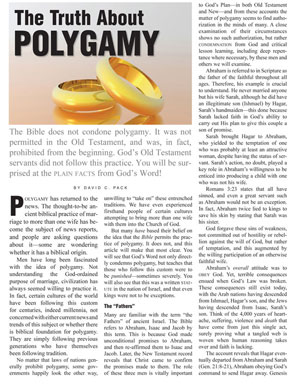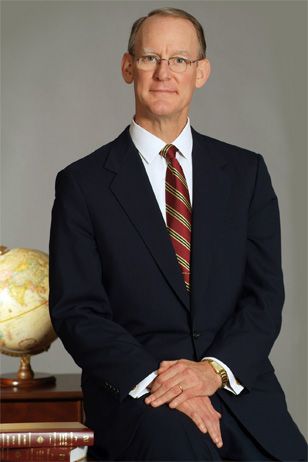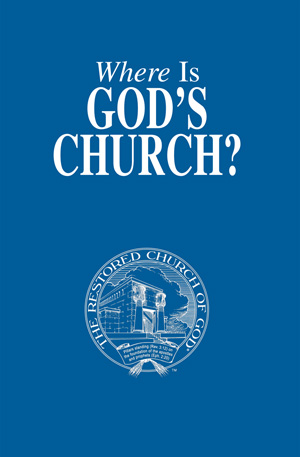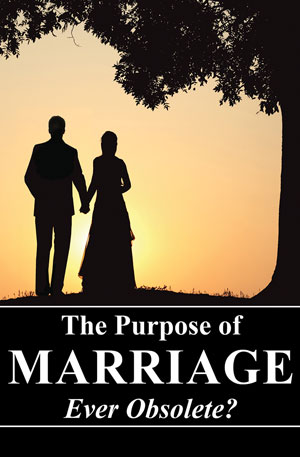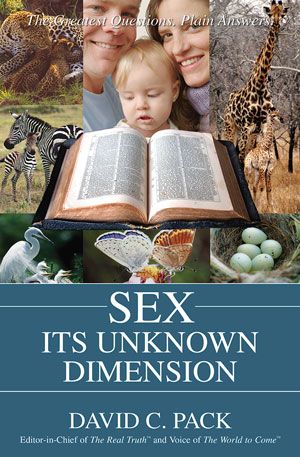Polygamy has returned to the news. The thought-to-be ancient biblical practice of marriage to more than one wife has become the subject of news reports, and people are asking questions about it—some are wondering whether it has a biblical origin.
Men have long been fascinated with the idea of polygamy. Not understanding the God-ordained purpose of marriage, civilization has always seemed willing to practice it. In fact, certain cultures of the world have been following this custom for centuries, indeed millennia, not concerned with either current news and trends of this subject or whether there is biblical foundation for polygamy. They are simply following previous generations who have themselves been following tradition.
No matter that laws of nations generally prohibit polygamy, some governments happily look the other way, unwilling to “take on” these entrenched traditions. We have even experienced firsthand people of certain cultures attempting to bring more than one wife with them into the Church of God.
But many have based their belief on the idea that the Bible permits the practice of polygamy. It does not, and this article will make that most clear. You will see that God’s Word not only directly condemns polygamy, but teaches that those who follow this custom were to be punished—sometimes severely. You will also see that this was a written statute in the nation of Israel, and that even kings were not to be exceptions.
The “Fathers”
Many are familiar with the term “the Fathers” of ancient Israel. The Bible refers to Abraham, Isaac and Jacob by this term. This is because God made unconditional promises to Abraham, and then re-affirmed them to Isaac and Jacob. Later, the New Testament record reveals that Christ came to confirm the promises made to them. The role of these three men is vitally important to God’s Plan—in both Old Testament and New—and from these accounts the matter of polygamy seems to find authorization in the minds of many. A close examination of their circumstances shows no such authorization, but rather condemnation from God and critical lesson learning, including deep repentance where necessary, by these men and others we will examine.
Abraham is referred to in Scripture as the father of the faithful throughout all ages. Therefore, his example is crucial to understand. He never married anyone but his wife Sarah, although he did have an illegitimate son (Ishmael) by Hagar, Sarah’s handmaiden—this done because Sarah lacked faith in God’s ability to carry out His plan to give this couple a son of promise.
Sarah brought Hagar to Abraham, who yielded to the temptation of one who was probably at least an attractive woman, despite having the status of servant. Sarah’s action, no doubt, played a key role in Abraham’s willingness to be enticed into producing a child with one who was not his wife.
Romans 3:23 states that all have sinned, and even a great servant such as Abraham would not be an exception. In fact, Abraham twice lied to kings to save his skin by stating that Sarah was his sister.
God forgave these sins of weakness, not committed out of hostility or rebellion against the will of God, but rather of temptation, and this augmented by the willing participation of an otherwise faithful wife.
Abraham’s overall attitude was to obey God. Yet, terrible consequences ensued when God’s Law was broken. These consequences still exist today, with the Arab nations having descended from Ishmael, Hagar’s son, and the Jews having descended from Isaac, Sarah’s son. Think of the 4,000 years of heartache, suffering, violence and death that have come from just this single act, surely proving what a tangled web is woven when human reasoning takes over and faith is lacking.
The account reveals that Hagar eventually departed from Abraham and Sarah (Gen. 21:8-21), Abraham obeying God’s command to send Hagar away. Genesis 25:6 states, however, that Abraham’s concubines’ (plural) sons were sent away, his other concubine being Susanna, as referenced in the ancient Austrian Chronicle. Abraham clearly ended these adulterous affairs. The fruit was that he removed the temptation from his life, along with the resulting illegitimate sons, in favor of cleaving to Sarah and Isaac, the son of promise.
Sarah did eventually die (Gen. 23:1-2), apparently well before Abraham. Only then did he lawfully marry Keturah (also Gen. 25). The biblical record speaks no more of polygamy in Abraham’s life.
Isaac
None has ever suggested that Isaac practiced polygamy in any form. An examination of his life reveals that he was actually an example of faith in God, believing that a son would be provided for him just as had happened with his own miraculous birth to Abraham and Sarah.
Here is what happened. Like her mother-in-law Sarah, Rebekah his wife could not bear children. Isaac did not use this as an excuse to find a handmaiden or some other potential “surrogate mother” to bear him a son, as happens in so many different contexts today. He had obviously learned from his father’s error and instead took the matter to God. Notice: “And Isaac entreated the Eternal for his wife, because she was barren: and the Eternal was entreated of him, and Rebekah his wife conceived” (Gen. 25:21).
It is evident that the father of the faithful, Abraham, had a son who learned from the faith that his father had developed, and demonstrated.
So Isaac was certainly not a polygamist. Again, as one of the fathers of Israel, this becomes even more important. He and his human father Abraham were types—Abraham the human type of God the Father, and Isaac a type of the Son of God. And Rebekah then becomes a type of the Church, who is destined to marry Christ. This is vital to see.
The story of Rebekah accepting Isaac to be her husband, and coming to love him before she had ever seen him because he was from a land far away, is a type of the Church coming to love Christ who is also from a far away country (Luke 19:12)—heaven. The Church will meet Christ—the only wife He will ever have—on her wedding day. (More of this later.) Thus, Isaac, as a type of Christ, had but one wife.
Jacob
Jacob, Isaac’s son, is one of the Bible’s greatest examples of how much a human being can change through the process of conversion. A pattern of sin and deception early in Jacob’s adulthood eventually disappeared as this great servant became something barely recognizable to those who had known him before his change. Turning from polygamy is part of this story.
The name Jacob means “supplanter.” Jacob did, in fact, supplant his brother Esau by unlawfully obtaining the birthright designated to the eldest brother through deception of their father—Isaac, then blind.
But Jacob later got what he gave when his father-in-law, Laban, terribly deceived him by supplanting his daughter Rachel—the one Jacob loved and was promised would be given to him in marriage—with his oldest daughter, Leah. Jacob became the victim of plain fraud, and the biblical laws of marriage permitted him to reject the marriage to Leah as soon as he discovered what his father-in-law had foisted on him. But he did not reject her as his wife. He accepted Leah, thus causing God to bind him to her as his wife—his only true wife in the eyes of God from that moment forward.
Jacob did eventually also marry Rachel. And this occurred before he was converted—before he was seeking God’s wisdom, will and overall direction in his life. In this pre-conversion period, he was pursuing what he wanted rather than what God wanted. The result: Jacob not only lived a life of polygamy with two wives, but also had children by the two handmaids of these wives.
Genesis 32:24-30 describes the conversion of Jacob. Chapter 35 verses 2 through 4 describe his coming out of idolatry after God changed his name to Israel. This new name meant “overcomer” or “prince of God—prevailer with God.” In time, God permitted Rachel to die (35:19), and Jacob remained faithful to his original and only real wife, Leah, for the rest of his life.
All people must turn from every form of sin, and polygamy was simply a sin like any other from which Jacob had to turn.
From Ancient Times
Further understanding of what God commands about polygamy continues with His instruction to Israelite kings. Careful instruction by God was necessary because, when Israel became a nation, and even in patriarchal times before that, wealthy men and kings often took multiple wives and established harems as symbols of success, power and royalty.
In this light, here is what God instructed all kings: “When you are come unto the land which the Lord your God gives you, and shall possess it, and shall dwell therein, and shall say, I will set a king over me, like as all the nations that are about me…But he shall not multiply horses to himself, nor cause the people to return to Egypt, to the end that he should multiply horses…Neither shall he multiply wives to himself, that his heart turn not away…” (Deut. 17:14, 16-17). Consider all that God could have instructed regarding kings and their conduct. Yet, He listed only a handful of points of paramount importance. Abstaining from polygamy was among them—and verses 18 and 19 state that it was “LAW”!
Saul, David and Solomon
In time, Israel wanted to copy the nations around her by having her own king. Saul became Israel’s first king. Though a physically large and no doubt very powerful man, Saul was weak of will and mental strength, and quickly became the first king to ignore God’s instruction about multiplying wives. Many of Israel’s sins and the sins of her kings are recorded for us to see. God can—and does—teach from both good and bad examples, although Israel more often demonstrated the latter. These become examples of practices to avoid. Saul’s sin (and multiplying wives was sin!) is such an example—and we can learn from it what to avoid. Space could be taken to show that Saul fell into a deep pattern of sins of all kinds, including that of murder, wrong forms of sacrifice, idolatry, consulting with a witch, and coming under the direct influence of demons.
Saul’s successor, David, also had several wives. But he deeply repented of this sin. Few seem to truly understand the biblical record on David’s action. The account is found in II Samuel 12.
Here is what is recorded, and God is doing the speaking: “Now therefore, the sword shall never depart from your house; because you have despised Me [what David did despised God, not just His law] and have taken the wife of Uriah the Hittite to be your wife” (vs. 9-12). Previously, David had conspired against and murdered Uriah, and had taken his wife Bathsheba for himself. God’s punishment was most severe. War (“the sword”) would pursue David for the rest of his life and would never “depart from his house”—and this even after he deeply repented.
Verse 11 describes what would happen: “Thus says the Lord, Behold, I will raise up evil against you out of your own house, and I will take your wives before your eyes, and give them unto your neighbor, and he shall lie with your wives in the sight of this sun.”
This is an astonishing account, and it shows how severely God will deal with this sin—a sin He considers against Him. God plainly stated that David’s wives would be raped publicly that very day—under “this sun.” The use of this term meant God would deal swiftly with what David did.
But there was another immediate event—and it was the result of God’s sentence: “David said unto Nathan, I have sinned against the Lord” (vs. 13). Psalm 51 details much more of how David was broken up, deeply convicted and extremely sorrowful for what he had done. The result of David’s repentance (now back in II Samuel 12:13), was Nathan declaring, “The Lord has put away your sin; you shall not die.”
Yes, David had practiced polygamy, but he turned from it in real, deep, sincere repentance—it could be said, as deep as was the punishment for disobedience. David continued in marriage to Bathsheba, with his only legitimate wife, Michal, almost certainly now dead (II Sam. 6:23). Upon returning to Jerusalem shortly after this time, David ended the relationship with his harem of ten concubines. Let’s read: “And David came to his house at Jerusalem; and the king took the ten women his concubines, whom he had left to keep the house, and put them in ward, and fed them, but went not in unto them. So they were shut up unto the day of their death, living in widowhood” (II Sam. 20:3). David did feel an obligation to provide for these women, but he no longer cohabited with them.
Let’s further understand. David’s wives, through public rape, and his concubines, because of polygamist marriage, had all been defiled. They were required to live in “widowhood.” Also understand that, as a virile young man who had been a great warrior, and who had pursued many women in his early years, David was able to change, and to come to spiritual maturity. The scriptures record that he “went fully after the Lord” (I Kgs. 11:6). (Anyone who finds himself in such a situation should follow David’s example.)
Repentance involves change—action!—and David followed through on his change of heart by ending all practice of polygamy in his life.
David’s son Solomon became the very reverse of his father’s pattern. He began as a righteous king who had tremendous faith in God, and was given wisdom like none other before or since. But Solomon also changed—and not for the good. Scripture records that “when Solomon was old” he accumulated 1,000 women in his life—700 wives and 300 concubines. This represents an incredible departure into the pursuit of pleasure and selfish accumulation—and it was plain sin. Solomon, like Saul, copied the kings of the surrounding nations. In this, the Bible records, “Solomon did evil in the sight of the Lord” (I Kgs. 11:6).
Some have used these examples—Abraham, Jacob, Saul, David and Solomon—to justify polygamy. A well-known, large, modern sect of professing Christians (involving millions) once believed these accounts permit polygamy, and thus reveal the mind of God on this subject. They followed this practice for decades before changing later. However, smaller breakaway groups from this “church” have secretly held to polygamy, willing to go underground to continue this illegal practice.
Why have so many been unable or unwilling to read the plain statements of Jesus—that marriage is between one man and one woman only?
GOD Binds Couples
Here is what Jesus taught in the New Testament: “Moses [not God!] because of the hardness of your hearts suffered you to put away your wives: but from the beginning it was not so. And I say unto you, Whosoever shall put away his wife, except it be for fornication, and shall marry another, commits adultery: and whoso marries her which is put away does commit adultery” (Matt. 19:8-9). Take careful note that Jesus’ instruction declares God’s will about marriage has been “from the beginning.” In other words, nothing has changed in the mind of God.
Now let’s examine the passages that led up to Christ’s instruction in Matthew 19. Here is what He had just finished saying previously: “Have you not read, that He which made them at the beginning made them male and female, and said, For this cause shall a man leave father and mother, and shall cleave to his wife: and they twain shall be one flesh? Wherefore they are no more twain, but one flesh. What therefore God has joined together, let not man put asunder” (vs. 4-6).
Again, let’s understand the vital points contained here. There are several. The instruction described was for the first couple—“at the beginning.” God’s command was that one man would cleave to “his wife,” not wives, and that they “twain”—two!—not three, four, five, eight or twenty!—would be “one flesh.” That these “twain” become “one” is the way God purposed it. It is what He always intended. In fact—and this is the most vital point—this is declared to be, when there is a marriage, what “GOD has joined together.” No man or group of men can change what God does in marriage. What does God do? He binds two people—one man and one woman—when a couple vows to spend their life together.
Recognize the basic fact that God prepared one wife for Adam. This is the Bible pattern, and God does not change (Mal. 3:6; Heb. 13:8). This is why Saul was punished for polygamy and David was also punished, but forgiven upon repentance. We saw that the sin of polygamy overtook Solomon, and in time God also punished him by taking the kingdom from his son, Rehoboam, just as He had rent the kingdom away from Saul’s house and given it to David’s house (forever).
Numerous Old Testament prophets were inspired to reference marriage as a monogamous union, one that was described as a symbol of the union between God and the people of Israel. These passages, and there are many, often describe an idolatrous ancient Israel who continually fell into committing what is described as adultery and whoredom with idols, with other gods in place of the true God.
No wonder the New Testament instruction for ministers is that “a bishop must then be blameless, the husband of one wife” (I Tim. 3:2). This also applied to deacons (vs. 12). No one who had previously practiced polygamy was to ever be considered for an office of the ministry, or even for the lesser physical service performed by deacons. While polygamists could be called into the Church—and this has happened many times through the centuries—they had to repent of polygamy. But those who would be examples before the flock—those ordained to offices of service—it is commanded could not have ever been involved in this practice!
The Greatest Marriage—Christ and His Church!
Numerous passages from the New Testament describe or reference how Jesus Christ will marry His Church. Take time to carefully read Ephesians 5:22-33. Follow this with the description of that glorious marriage between Christ!—the Lamb—“and His wife [who] has made herself ready” (Rev. 19:7-9).
Now consider the modern world of professing Christianity—much better described as churchianity, for it includes hundreds of denominations and sects that do not follow the plain words and doctrines of the Bible. These all suppose Christianity—Christ’s bride—to be composed, collectively, of all these many competing, disagreeing, divided and continually multiplying groups, organizations and “fellowships.” These “churches” have supposed that Jesus will some day gather and marry all of them as His bride.
How deceived!—how confused!—HOW WRONG!—are so many millions!
Jesus Christ promised, “I will build MY Church” (Matt. 16:18). Men certainly have built a great many of THEIR churches—and I repeat that there are hundreds—but these are NOT the only Church built by the all-powerful, living Jesus Christ. As the author of marriage between one man and one woman, He will not enter an eternity of confusion by marrying a host of disagreeing “wives.” Today’s churches will soon be shocked in disappointment at how deceived they have been. Yes, God will eventually, later in His Plan, call these countless millions to His truth. But at Christ’s Return, now soon before us, they will be SHUT OUT of a marriage they think themselves destined to attend. (The reader should take time to carefully study our thorough booklet Where Is God’s Church? in this vital regard.)
You are also encouraged to read other booklets we have produced on the subject of marriage to complete the BIG PICTURE of what has been described here. These are The Purpose of Marriage – Ever Obsolete?, You Can Build a Happy Marriage, Sex – Its Unknown Dimension and Understanding Divorce and Remarriage.
These booklets explain the sanctity of marriage—a union always involving just one man and one woman—and the overarching supreme purpose of this God-ordained institution within God’s marvelous Plan!



